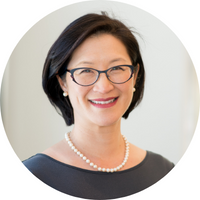
What is one area where universities are highly successful in preparing chemists for employment in the pharma industry? And what is one area where universities can improve?
I believe that colleges and universities are highly successful in building a foundation in terms of technical knowledge for chemists. On top of formal education, universities and colleges provide chemists with important experiences that go beyond what we learn in classes: many years later, I reflect on how I acquired resilience (because independent research is challenging and so many of my reactions failed), confidence (I will admit that even in graduate school, I was reluctant speak up for fear of saying something wrong), and teaching skills (being a TA made me a better communicator, and mentoring an undergraduate researcher required a lot of time and attention, but was extremely rewarding).
These experiences helped to prepare me for a career in the pharmaceutical industry, where we apply our technical expertise to meaty problems with the goal of discovering new medicines to improve patients’ lives. I would argue that such skills and experiences would be applicable to any career, and not only jobs in the pharmaceutical industry.
In my opinion, universities could do a better job illustrating to chemistry students the breadth of rewarding career choices we have. When I was in graduate school and doing my postdoc in the nineties, I sensed that the “best” people went into academia and landed jobs as professors at major research universities. Going into industry was perhaps a more practical and less coveted choice. My friends include fellow chemistry majors and PhDs who are happily employed as patent lawyers, medical doctors, technical salespeople, entrepreneurs, project managers, business development leads, accountants, and more. May I put in a plug? I highly recommend the ACS Careers & the Chemical Sciences website for people who would like to learn about some of the many potential careers for chemists.
For those of us not in the business of drug design, can you give us a better sense of just how difficult this can be?
This may sound flippant, but I will say it anyway: drug design would be easy if we had a crystal ball that could tell us what target to work on, what modality to use to try to find a potential drug for the target, how to find a starting point, how selective the drug should be, what the pharmacokinetic profile of the drug should be, how much target coverage is needed, and so on.
At the time that we nominate a compound as a potential drug, we are stating that this chemical structure is what we are willing to invest in for further study to bring it to clinical trials. Imagine if this were your own money: you’d be placing a hefty bet. And the bets get bigger and bigger as the potential drug progresses through clinical trials.
What does the nature of COVID-19 tell you, if anything, about the prospects of such pandemics in the next ten years?
Well, too bad I used up my crystal ball for the last question! I would say that the COVID-19 pandemic has taught us a lot, beyond what we learned from recent, and more distant pandemics. So many people have succumbed to COVID-19; I am shocked and saddened. We are trying to figure out how to fight this virus and manage risks in our day to day lives, at home, at work, and so on. I would not be going out on a limb to say that regardless of the prospects of such pandemics in the next decade, we should be better prepared now.
In the May 9, 2020 issue of Chemical & Engineering News, you wrote a comment on the many ways ACS can help chemists grow in their careers. What inspired you to write on that topic?
I’ll tackle this question in three parts. First, I think that for a lot of chemists in college and graduate school, a looming question is, “Will I be able to find a job?” And as we move along in our careers, we may be asking questions such as, “What do I want to do next?” or “How do I get promoted?” or “What if I get laid off?”
Second, as I have volunteered more and more for the ACS, I continue to learn about additional career resources that the ACS offers. I thought that chances were good that if I didn’t know about some of these resources, that other people didn’t, either.
Finally, I am often asked what the value of ACS membership is. The comment I wrote, with help from Tom Halleran and John Katz, includes highlights of career resources that are exclusively for ACS members.
Are you seeing improvement in the ability of women to obtain positions in upper levels of management in the pharma industry? And if so, what’s responsible? What else can be done to accelerate progress in this area?
I am seeing some improvement in the number of women in leadership positions in the pharmaceutical industry, and I believe that there is a lot more to be done here. For example, see this report on Women in the Workplace from the HBA Gender Parity Collaborative. It may be that people who are in the position to make decisions on who to place in upper levels of management understand the value of gender parity and different kinds of diversity.
Changing the culture and mindset of an organization takes time. I like the idea of raising diversity when we make decisions, and I think that having concrete guidance helps. In the ACS Division of Organic Chemistry, for example, people who submit a proposal for an organized symposium must answer questions about the diversity of the potential speakers right in the symposium proposal template.
More generally, what can pharma do to make the workplace more welcoming and rewarding for women and minorities?
I have many thoughts on what we can do to make the workplace more welcoming and rewarding for not only women and minorities. I would broaden my response to address various aspects of diversity, such as age, race, religion, country or ethnic origin, citizenship, language, sex, gender identity and expression, sexual orientation, disability, and economic class in academic, industrial, and government workplaces.
For me, this goes beyond policies and intentions: this is about our actions, our communications, and our decisions, and how they are perceived. As a member of a leadership team at work, I am conscious of the influence that I have, and I speak up about considering diversity in our decision-making, for example, with regard to recruiting, project leadership opportunities, and so on.
Mary Boyd, who was Chair of the ACS Division of Organic Chemistry when I was Chair-Elect, has been extremely inspirational to me as a proponent of diversity. I also act as a mentor to various people and strive to build relationships where we can have honest and open conversations about navigating different situations at work and advocating for ourselves.
What motivated you to serve as a mentor to early career female scientists with the Healthcare Businesswomen’s Association?
I joined the Boston Chapter of the HBA to attend seminars on some topics that sounded interesting and broaden my network to include people in research as well as other functions in the healthcare industry. I took part in the HBA mentorship program first as a mentee and found it to be a wonderful experience, well worth the time to gather monthly in a small group to share our career goals and challenges. When I was approached to be a mentor, my answer was a resounding yes. It has been very helpful for me to have a team of informal advisors to reach out to throughout my career, and I wanted to lend a hand to some early career women.
What is the one personality trait that has been most instrumental in your career success?
I am naturally curious and am not afraid to ask questions or share my opinions. On my first day of work at Wyeth, the head of our chemistry group told me that no question was a dumb question. That resonated with me. I continue to ask lots of questions and encourage others to, as well.
How have your parents influenced your leadership style?
This is an interesting and personal question. I take after my dad in that I like to have the spotlight on me (for example, I love to give presentations) and thrive on positive feedback. My mom has given me empathy, listening skills and creativity. My mom and dad were easygoing in raising me and my sister; we are both self-motivated.
What does this all have to do with my leadership style? I want my teams to be successful, and I tend to lead in a positive and upbeat manner. I realize that we are all different in what makes us tick, and to understand what motivates people requires listening and asking the right questions. Also, I try not to take myself too seriously, and I like to foster some fun at work.
In part, you are in the business of leading teams at Pfizer. What makes for a successful leader of teams?
About a year and a half ago, I made the leap from being a Research Fellow in medicinal chemistry to become the Head of Strategy and Operations for the Inflammation and Immunology Research Unit at Pfizer. As a medicinal chemist, I led chemistry teams and project teams, and I supervised chemists. In my current role, I lead a group that includes a chief of staff, alliance manager, business manager, and administrative assistants, and we work with partners in biology, clinical, chemistry, large molecule drug discovery, safety, finance, business development, communications, and others.
To be a successful team leader, one has to demonstrate commitment to the team as a fellow team member, to get to know the team members and treat people with respect, and to clearly communicate objectives and decisions. I find also that it helps to foster trust and camaraderie among the members of the team. We should feel like we are working together rather than performing a series of transactions.
How has your volunteer work with the Northeastern Section of the American Chemical Society (NESACS) helped you achieve greater success in your ‘day job’ at Pfizer?
Serving as an active volunteer in NESACS has helped me become a better leader. NESACS members are diverse in terms of area of technical expertise, work affiliation, stage of career, years of service to the section, areas of interest, geographic location, as well as more personal characteristics; what we have in common is that we serve our local section as volunteers.
NESACS gave me the opportunity to have leadership experience before I had the same kind of experience in my ‘day job’ at Wyeth and then Pfizer. I chaired the Host Local Section Committee then became a Councilor, and I was honored to serve as Chair of the section; currently I chair the NESACS Board of Publications.
Having responsibility for our budget, welcoming new members (and encouraging them to join committees!), putting into place special initiatives, running monthly board meetings, serving as the Program Chair and organizing monthly meetings, and doing a lot of work behind the scenes was all valuable experience that has helped me in my day job. Volunteering for NESACS helped me to flex my influence and organizational skills and become more comfortable making difficult decisions and working with different people.

Katherine Lee obtained her B.S., summa cum laude, with Distinction in Chemistry from Yale University and her Ph.D. in Organic Chemistry from MIT with Professor Rick Danheiser. Katherine then did postdoctoral studies at the University of Texas at Austin with Professor Stephen Martin before joining Mitotix, Inc. (now Agennix) as a medicinal chemist. Katherine moved to Wyeth Research (now Pfizer) in 2000 and in 2009 joined Pfizer.
Katherine is an expert in medicinal chemistry, with research interests including fragment-based drug design, structure-based drug design, and optimization of ADME and safety properties.
Katherine is a co-inventor of several clinical compounds, including a first-in-class IRAK4 inhibitor in Phase 2 and two cPLA2a inhibitors that achieved Phase 2 Proof of Concept. In 2019, Katherine joined Pfizer’s Inflammation and Immunology Research Unit as Senior Director and Head of Scientific Planning and Operations.
Katherine was the 2015 Chair of the Northeastern Section of the American Chemical Society (NESACS) and the 2018 Chair of the ACS Division of Organic Chemistry (ORGN). In 2019, she joined the ACS Board of Directors as the District I Director.
The opinions expressed in this article are the author's own and do not necessarily reflect the view of their employer or the American Chemical Society.
Copyright 2020 American Chemical Society (All Rights Reserved)








